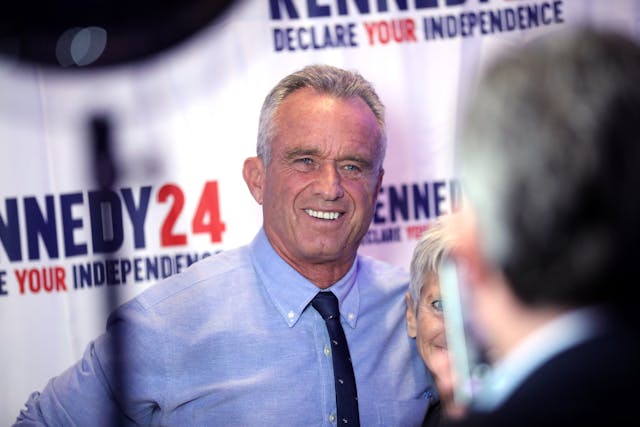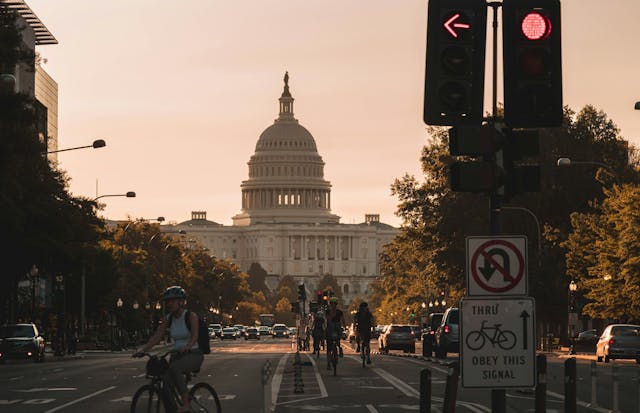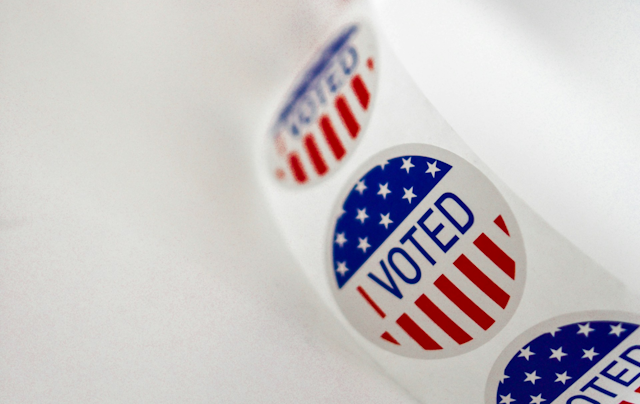The Transpartisan, Grassroots Movement to Overturn Citizens United is Gaining Serious Momentum

In recent years, there have been several top-down attempts to overturn the Supreme Court's decision in Citizens United. That decision, made in 2010, birthed legal entities known as super PACs, which can raise and spend unlimited sums of money so long as they do not coordinate with a candidate.
In 2014, Democrats failed to muster enough votes to overcome a Republican-led filibuster over a proposed constitutional amendment. And in 2015, Harvard law professor Lawrence Lessig announced a presidential campaign with the stated goal of reforming the country's elections and campaign finance system through the passage of a single bill. But Lessig (who had previously launched Mayday PAC – a "super PAC to end all super PACs") was kept out of the Democratic debates with a last-minute rule change and subsequently aborted his candidacy.
Meanwhile, there is a transpartisan, grassroots movement demanding reform from below, calling on lawmakers to clarify and limit the rights of corporations, allow governments to regulate political spending, and even to amend the Constitution to – in word or in spirit – overturn Citizens United.
One route has been through local and state governments. Since 2010, nearly 700 communities across the country have called on the federal government to amend the Constitution.
Many states have demanded reform as well. In 2010, Hawaii became the first state to call on Congress to propose a constitutional amendment that would allow the federal government and the states to regulate corporate speech.
Thereafter, numerous states followed suit with similar measures. Some, such as Delaware and Maryland, sent letters to Congress with support from majorities in their respective legislatures, while others, such as Massachusetts and West Virginia, passed formal resolutions.
And in 2012, nearly three-fourths of voters in Colorado and Montana approved ballot measures calling on Congress to pass a constitutional amendment. Both measures urged their respective congressional delegations to support and promote an amendment restricting the rights of corporations.
Notably, these measures have had transpartisan support: a Bloomberg poll from 2015 found that 78 percent of respondents believed that Citizens United should be overturned, including 80 percent of Republicans, 83 percent of Democrats, and 71 percent of independents.
In Janesville, Wisconsin – the hometown of Republican House Speaker Paul Ryan – an advisory referendum sponsored by United to Amend passed with 84 percent support. And this summer, New York became the seventeenth state to call on the federal government to change the law to allow states to regulate election spending – the first state to do so with at least one chamber controlled by Republicans.
The ballot measures approved in Colorado and Montana also had transpartisan support: Montana is a solidly red state, and in Colorado, the measure was supported by majorities in every country – blue, red, and purple.
While these measures – resolutions, letters, and ballot questions – have largely been non-binding and symbolic, at least one measure seeks to attack super PACs head-on.
In July 2016, the city council of St. Petersburg, Florida agreed to vote later this year on a proposed ordinance that would require corporations looking to influence city elections to certify that they are not foreign-influenced and would place a limit on the amount of money that individuals can contribute to an outside spending group.
The ordinance, if passed, would be a direct affront to the decision in SpeechNow.org v. FEC. That ruling, handed down by the D.C. Circuit Court months after the Supreme Court's Citizens United decision, abolished contribution limits to super PACs.
This ordinance represents a second strategy in the grassroots movement: litigation. Looking long term, the movement seeks to have the Supreme Court revisit the decisions in Citizens United and SpeechNow.org with the hope that a full nine-member Court – leaning left – might overturn these precedents.
This strategy was recently implemented when a team of lawyers – backed by Democratic, Republican, and non-partisan complainants – filed a complaint with the Federal Election Commission (FEC). The complaint urged the FEC to investigate 10 super PACs it claims have violated election law by accepting contributions above $5,000. Its purpose: to put a challenge to the SpeechNow.org decision on track to appear before the Supreme Court.
Yet some have questioned whether this particular approach will be effective. According to several analysts, the FEC is bound to defer to the Circuit Court's precedent and thus will likely result in defeat.
Richard Hasen, writing in a July 2016 post on his Election Law blog, noted that there may be a better approach.
"A far more straightforward way to tee up a SpeechNow challenge at a new liberal SCOTUS would be to find a liberal city (or state) that wants to enact (or defend an on-the-books existing) limit on contributions to independent expenditure committees, " he wrote. "Those cases would most likely lose in the lower courts but would be explicitly geared to tee up the issue for SCOTUS consideration."
The St. Petersburg ordinance, if it is passed this fall, might prove to be that case. If it is challenged, it would bypass the D.C. Circuit Court on its way through the federal judiciary on its way to the Supreme Court.
For those who want to reform the current campaign finance system, the passage of the city ordinance is just one of the many important fights to win this election cycle. Washington state and California are voting on ballot questions that, if passed, would ask their respective congressional delegations to support an amendment to overturn Citizens United.
Perhaps most importantly, the outcome of the presidential election could determine the future composition of the Supreme Court. While candidates Donald Trump and Hillary Clinton have both criticized the Citizens United ruling and have expressed sympathy with campaign finance reform, Clinton has been more vocal about her views.
Clinton has stated that she will appoint justices "who understand that this decision was a disaster for our democracy," and she will call for an amendment to overturn the decision within the first 30 days of her presidency. (Trump has made no such promises, and he recently hired the former president of Citizens United as his deputy campaign manager, whose challenge to the pre-existing campaign system finance led to the decision.)
While the presidential election is certainly important for the grassroots movement, it may not be decisive. Reform can be achieved with or without the Supreme Court: in a representative democracy, it is voters and their representatives who make the laws – and who can amend the Constitution itself.



